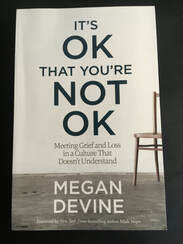 “Loss stuns us into a place beyond any language ... Language is a cover for that annihilating stillness, and a poor one at that.” (Megan Devine, It’s OK That You’re Not OK) 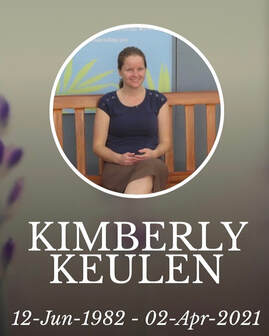 In the months leading up to Kim’s passing, Kim and I talked a couple of times about her memorial. We made a rough plan of what it might look like and who she would like to speak at it, and we talked about a couple of songs we would either sing or have played. We also talked about timing of the memorial, and that she wanted us to wait until after COVID was over so there wouldn’t be any restrictions on who could attend. Kim wanted everyone who wanted to attend to be able to do so. She was always thinking of others. When we made these plans, all signs pointed to COVID-19 being significantly weakened, if not in our rear-view mirror by the end of summer 2021. The vaccine was rolling out, and summer was coming. What we didn’t know was that the fourth-wave of COVID was also about to begin. As you now know, we were not able to honour all of Kim’s wishes. In August, when we met as a family to discuss plans for a memorial, we all felt that if Kim knew the current situation, that the Delta-Variant was now active and growing, and that it was most likely going to spread through schools once September hit, she would most likely have said, “OK, get it done already.” And so, with that, we went ahead and had Kim memorial on September 10th, with a limit of 200 people in attendance and COVID safety measures in place to ensure we did not become a spreader-event and to protect persons like myself. I mention all this as background to this next chapter of my grief. Because we waited five months to hold Kim’s memorial, I believe the experience of her memorial was much different than if we had held it within the first month. In the week leading up to Kim’s memorial, I felt a growing anxiety within me. Not only was I worried about how painful and difficult the actual event of Kim’s memorial would be, but there was something else happening, a feeling I couldn’t put into words. It felt as if a chapter of my life was coming to an end. With Kim’s memorial happening on a Friday night, I had this feeling that something was going to happen over the weekend, that there was an "opening," an abyss, that was about to engulf me. I felt as if I was coming to the edge of a cliff. I am so incredibly proud of Kim’s memorial. I am thankful to everyone who spoke and how they honoured Kim with their words and stories. Pastor Jenna Fabiano, who officiated, did such an excellent job as well. The musicians also brought such a peaceful atmosphere to the building. I was so grateful that Kim could be honoured in such a powerful way. 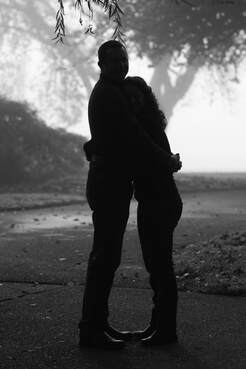 The rest of that weekend, however, just kind of slipped by. I worked on Saturday to try and keep my mind busy (we were in the middle of corn harvest). On Sunday, I stayed in my PJ’s all morning until I went to the farm in the afternoon to work again. But something happened on Monday morning. That thing I had felt inside of me, that change that I felt coming during the previous week, that anxiety, finally came to the surface. Monday, September 13th, was a bright and beautiful morning. I woke up at my regular time, had breakfast, did my lung function tests as I do every morning, and then decided to go for a walk. I was about three-hundred meters from my house, about to cross a street (I can picture it clearly in my mind), when all of a sudden, a phrase came into my head that stopped me dead in my tracks: Today is the first day of the rest of your life. That was it! That was what the growing anxiety, the suspicion of what Kim’s memorial would mean. A new chapter, a new life, was now beginning. But, whereas this phrase, the first day of the rest of your life, is often used in a positive or motivational fashion, this instance of it came with nothing but immense life-piercing sorrow. In the five months preceding the memorial, it still felt like I was somehow living with Kim. I don’t know if it was because of the shock that I wrote about in the previous post, if it was because her passing was still so fresh, or if it was because we had not yet had her memorial; but it felt like Kim was still with me somehow. The chapter had not yet ended. During the summer, I was still anticipating something with Kim. The symbolic book of our marriage, our journey together, had not yet finished. Throughout the spring and summer, there was still something to come that had to do with Kim, something I would still do for her, something that Kim would be part of, that she would be central in. Kim’s chapter had not yet ended. However, with her memorial, and the symbolic nature that memorial services often take on, it was as if the chapter was now closed; and now, on the following Monday morning, I was staring at a blank page. Nicholas Wolterstorff, in this book, Lament for a Son, writes, “Something is over. In the deepest levels of my existence something is finished, done. My life is divided into before and after.” 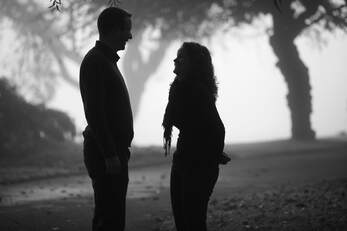 It was as if there was this open space, this empty silence in front of me. It felt like I was expected to move on, that any excuse of not making plans for the future, of finding stability, were now over. There was nothing to look forward to, no more ending point; there was now just a future without Kim. It felt like the chapter, whose title still included Kim’s name in it, was now done, and from here on out, the chapter titles would only have my own name. From this moment on, it felt as if Kim would now exist only in my memory. And each day after the memorial would feel as if I was moving further and further from her. Again, in this book, Lament for a Son, Wolterstorff writes, “It’s the neverness that is so painful. Never again to be here with us––never to sit with us at the table, never to travel with us, never to laugh with us, never to cry with us, never to embrace with us ... All the rest of our lives we must live without [her]. Only our deaths can stop the pain of [her] death. A month, a year, five years––with that I could live. But not this forever.” Here is something I just thought of in writing this (writing always helps me process things). The word “widowed” means “to be empty.” Since Kim's memorial, I have been saying that I have this sense of “openness” in front of me, but I always need to qualify that by saying it is not a good thing. It is like being unanchored in a storm or staring out the door of an airplane with no parachute. But maybe instead of saying I feel this sense of “openness,” I should say I feel a sense of “emptiness” in front of me. I know I feel empty inside. I feel like the shell of the man I was a year ago. But maybe that is also the word that best describes how I feel about the future: EMPTY. 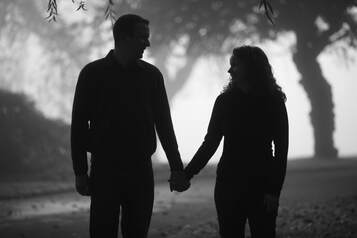 I’ve used part of this quote in an earlier blog post, and I wasn’t planning on using it here, but I think it fits. Again, it is by Nicholas Wolterstorff: “Let me try again. All these things I recognize. I remember delighting in them––trees, art, house, music, pink morning sky, work well done, flowers, books. I still delight in them. I’m still grateful. But the zest is gone. The passion is cooled, the striving quieted, the longing stilled. My attachment is loosened. No longer do I set my heart on them. I can do without them. They don’t matter. Instead of rowing, I float. The joy that comes my way I savor. But the seeking, the clutching, the aiming is gone. I don’t suppose anyone on the outside notices. I go through my paces. What the world gives, I still accept. But what it promises, I no longer reach for. I’ve become an alien in the world, shyly touching it as if it’s not mine. I don’t belong anymore. When someone loved leaves home, home becomes mere house.” I think it felt like Kim had not entirely left before her memorial. But now that the memorial was over, I felt suspended. She is gone for good other than in my memory. Life got back to normal for everyone else, but my life (and those who loved her) would never be the same. I go through the motions of life, and I can find some enjoyment in them, but the big questions of life that matter are left empty; they are unanswered because I don’t know how to answer them. This chapter of discerning this sense of emptiness continues today. When I try to look ahead, it is still an abyss. However, the “purity” of this emptiness lasted only for a week or two after Kim’s memorial, as is was soon filled with a fog of depression. The season of grief that followed Kim’s memorial was maybe not as visceral and unpredictable as certain moments that preceded it in the spring and summer, but it was more profound and painful. As September turned into October, and even as good and exciting things began appearing on the horizon, I started slipping into a depression and fearfulness that I had never experienced before.
0 Comments
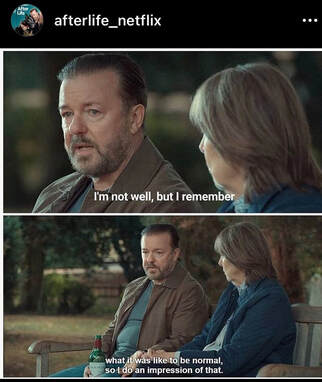 “The reality of grief is far different from what others see from the outside. There is pain in this world that you can’t be cheered of ... Some things cannot be fixed. They can only be carried.” (Megan Devine, It’s OK That You’re Not OK”) As I reflect on the past seven months without Kim, I see that what I might call a “first chapter” of my journey with grief happened during the spring and most of the summer of this year. There are two defining features that I see at play throughout that time. The first was shock; the second was a complete loss of identity. Shock. Back in May 2019, I broke my arm. I was mountain biking in Watershed Park, just minutes from my house. I was riding a downhill trail, one I had done many times before. I came to a tabletop jump whose landing went immediately into a sharp right-handed bend. I hit the jump fine, but in landing, my rear wheel hit the edge of the tabletop, which then ejected my bike forward straight into the high-side of the lefthand berm. My front tire hit this wall of dirt, and my bike and I went flying through the air, wheels over handlebar. While flipping over in the air, I remember thinking, “don’t worry, you’ll be okay, you’ve crashed hard before.” However, when I hit the ground and came to a stop (sitting upright), I noticed that I was covered in blood. I then looked at my right arm and saw that it was bent in a way it was not supposed to ever be bent, and there was a bone sticking out of it. In the three seconds it took to realize how much trouble I was in, I remember thinking, “Please, shock, do what you were made to do!” 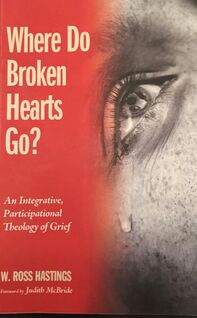 Ross Hastings, a professor of mine at Regent College, and whose wife passed away from cancer in 2008, has written a book on grief, Where do Broken Hearts Go? In it, he writes, “For one thing, when a loved one dies, no matter how well prepared we think we are, we shut down in various ways and to different degrees. We are in shock ... Shock, our involuntary defence mechanism, is actually a gift.” Before reading these words in 2016, the same year that Kim was first diagnosed with stage-four colon cancer, I had always thought that shock was a bad thing, that it was somehow an escape from reality. A weakness or something that wasn’t the best way to process or move forward (to be sure, one cannot live in a state of perpetual physical shock; its symptoms can kill a person. When I broke my arm, I experienced many of those symptoms: drop in blood pressure, profuse sweating, skin turning grey or white). But what I didn’t understand before reading this book is that shock is actually a saving grace. Shock is a natural way for the body to survive, for short periods of time, immense life-threatening pain. Back in 2019, sitting beside a tree with a bone sticking out of my arm, shock is what gave me the survival instinct and ability to stand up (albeit on the edge of fainting) and walk/shuffle out of the forest so that the ambulance could pick me up and bring me to the hospital as fast as possible. In the same way, in the immediate days, weeks, and months after Kim passed away, shock was one of the main things that helped me survive what would have been insurmountable emotional pain. Sitting here today, most of the spring and summer is a blur to me. Most of my memories from just a few months ago are swallowed into an indistinguishable mass. There are things I know I did, people I met, family I spent time with, but the details are a fog. Meeting a friend at White Rock beach on several occasions to watch the sun go down and share memories of Kim. Having a close friend come over for drinks to check in on me. Getting together with Kim’s family, where one of Kim’s brothers made all of our drinks a little stronger than usual, thus helping dull the fact that Kim was so painfully missing. And, of course, putting in a lot of time working on the farm. But many of those memories are a blur. What was said, and the number of times they were repeated, is all lost. I was in survival mode. I knew I needed to talk to people, so I sought out friends, or they sought me out. I knew I needed to get out of the house, so I went for drives, walks, bike rides, or sat on the beach. But looking back, it is as if I was on autopilot and I wasn’t taking anything in. I was trying to survive until the following day, just putting in time. The shock prevented the pain of Kim’s absence from reaching the core of my being, but it also stopped everything else in life from penetrating as well. Now don’t get me wrong. In the weeks and months after Kim passed, there were moments of incredible pain. Times where I would be lying face down on the couch, pounding the pillows with everything I had, and expelling groans too deep for words. In those moments, I didn’t know how I was ever going to go on. There were times I wept openly in front of friends and family. Times I felt I couldn’t go on and didn’t want to go on. But despite those moments of complete disorientation, I was also able to function in ways that surprised me. It was as if the shock would let off a pressure release of grief so that I didn’t explode, but it also protected me from feeling the full impact so close to the event. 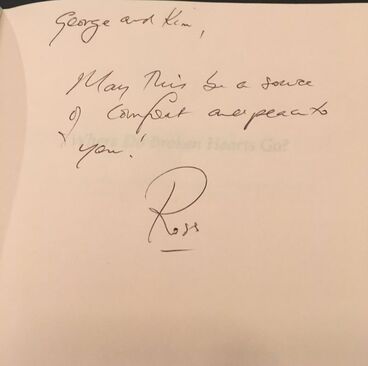 Kim and I attended Ross' book launch just months after Kim's initial diagnosis. He signed our copy appropriately. Kim and I attended Ross' book launch just months after Kim's initial diagnosis. He signed our copy appropriately. “With shock comes numbness and an unintentional sense of denial. Our minds cannot grasp it. Our emotions are too powerful to be processed at that time. If we did not have defence mechanisms in place, we would not be able to handle the reality of our losses. Their full impact would kill us.” (Ross Hastings, Where do Broken Hearts Go?) 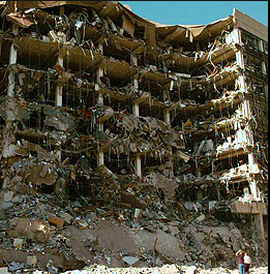 This idea of being in shock was not something I was totally aware of at the time (at least, I don’t think I was). It was not until August began winding down and I entered into some deeper reflection that I realized how much my internal defense mechanisms had protected me during the first four months of being without Kim. Identity The second significant piece of my grief puzzle, however, had to do with my identity. One thing that I did feel within the first weeks after Kim’s passing was a total and complete loss of identity. In being married to Kim, we had created an identity together. We didn’t lose our individual identities to each other, we were still two very different people, but we had also come to create a new identity as one person. With Kim now being gone, it was as if half of me had been torn away. I felt like a building you might see on the news, where half of it has been bombed to rubble, and so each floor of the building ends in midair, and wires and pipes are sticking out into nothing. I felt like my identity had been cut in half, ripped apart. And with this came a total loss of confidence. I think I am a fairly courageous person. Through life experience, I have come to see that there is not a lot in life that we can have control over or hide from, and so it is often better to just hit difficult situations head-on. However, I am not a confident person. Never have been. As a kid, I would always get sick to my stomach before hockey games. I feel I am often timid in social settings where I don’t have a leadership role. But never has my lack of confidence been more acutely felt than now, without Kim. I didn’t realize it until she was gone, but I ran almost everything I did past her. Something as simple as what to wear to church when I was preaching; I would always come downstairs after showering and dressing, stand in front of Kim, and ask, “Is this okay?” Whenever I would purchase something (other than books), I would ask what she thought. We would often go for walks in the evening, sharing about our day, talking through all our decisions in life. I am an over-thinker, and so often, the only way I would make a big decision was when Kim would finally say, “Just do it already.” 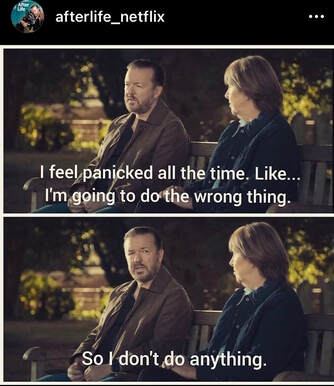 With her gone, I now feel paralyzed and panicked. This summer, when I began making final edits and approvals for my book, I broke down. I had no clue if anything I was rewriting was any good, if it made sense, or even fit in my story. I had no clue how to pick the image and design for my front and back cover. I felt hollow. Thankfully, my sister-in-law, Heidi, who has a very keen eye for design and was excited to help with my book, walked me through the final half-year of publishing. I no longer knew who I was, what I liked, or what I wanted. I had lost my identity, I had lost all confidence. The final quote I will use from Ross Hastings' book is this: “I think grief is the process of shock thawing out.” Sitting on the side of 64th Avenue back in May 2019, a truck-load of firefighters standing around me, I knew that my shock was soon going to dissipate. Now that I was out of the woods, first responders present, my body was beginning to feel safer. The paramedics arrived within minutes. They wrapped my arm, got me onto the stretcher, and loaded me into the back of the bus. The driver closed the doors, walked around the side of the vehicle, got behind the wheel, and we were off the hospital. At that point, my body relaxed. I was safe. But it was then that the pain of my broken arm and shattered elbow hit me like nothing I had felt before (transplant included). For the rest of that ambulance ride, I was sucking back on the laughing gas as hard as I could. As August of this year turned into September, I began feeling some semblance of safety. I was starting to take some steps in feeling comfortable with myself, comfortable being alone in the house, and discovering a bit more of who I now was and who I wanted to be. But like being in the back of that ambulance, as I was beginning to feel safer, the pain also began hitting much more powerfully. Kim’s memorial was now less than ten days away, and I knew something was going to happen. I knew it would be incredibly painful and that the shock of spring and summer was thawing. But in the days leading up to Kim’s memorial, I knew that something else was brewing, something I couldn't put into words. I could sense an abyss opening up in front of me. I just didn’t know what it was. |
George Keulen's BlogWelcome to my blog. This is a place to find periodic updates on life's ups and downs as I face some old/new health challenges. Some of the updates will be written by me, while others will be updated by my wife, Carrie. Archives
July 2024
Categories
All
|
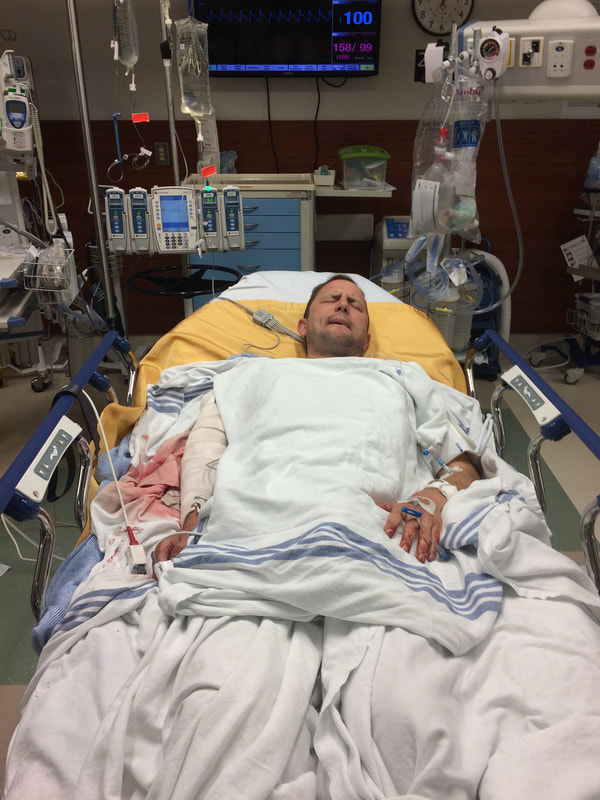
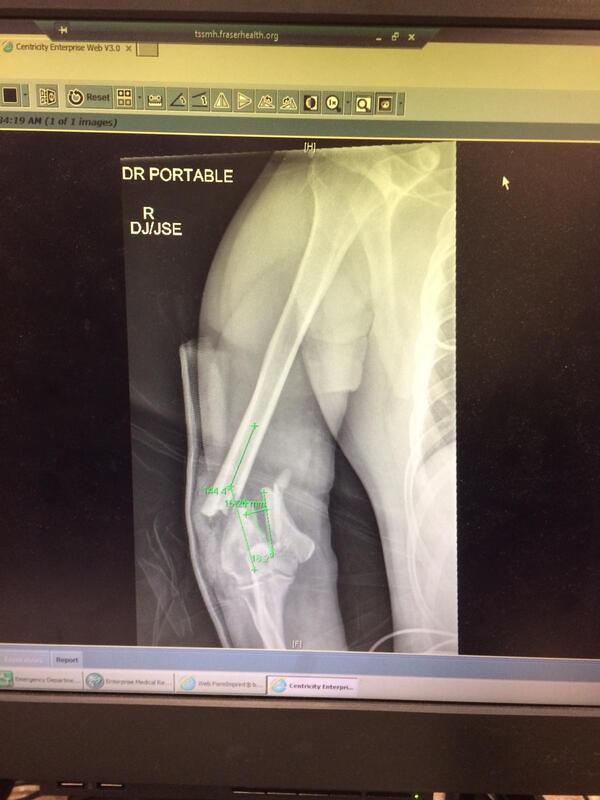
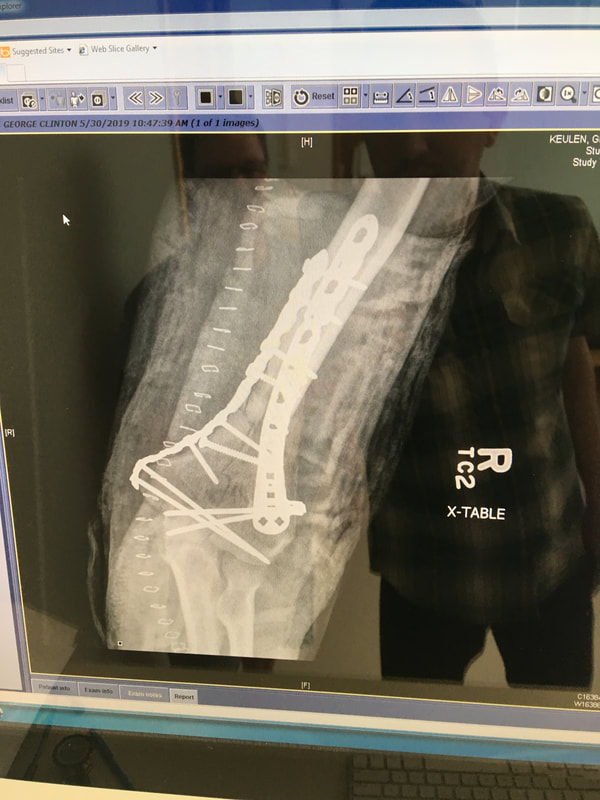
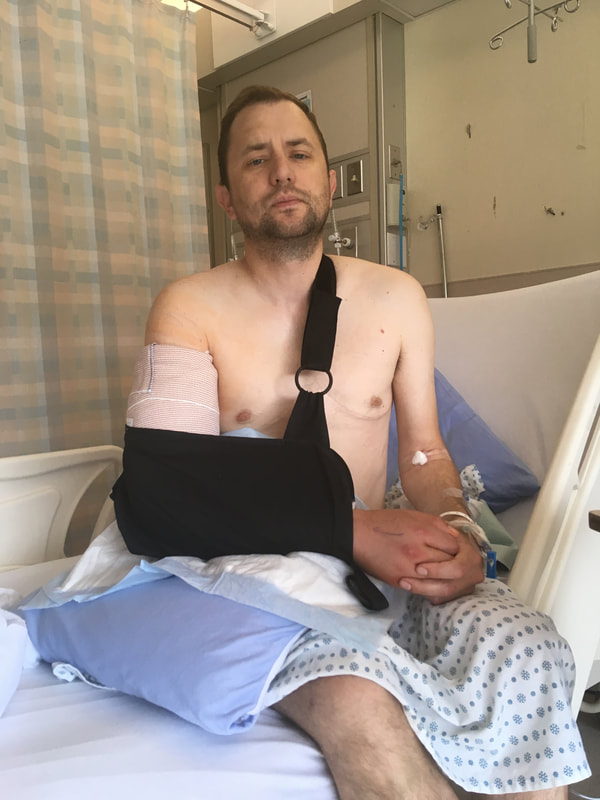
 RSS Feed
RSS Feed
